Collect and process large data sets. More...
#include <Dataset.h>
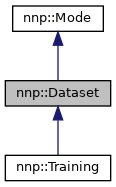

Public Member Functions | |
| Dataset () | |
| Constructor, initialize members. | |
| ~Dataset () | |
| Destructor. | |
| void | setupMPI () |
| Initialize MPI with MPI_COMM_WORLD. | |
| void | setupMPI (MPI_Comm *communicator) |
| Initialize MPI with given communicator. | |
| void | setupRandomNumberGenerator () |
| Initialize random number generator. | |
| std::size_t | getNumStructures (std::ifstream &dataFile) |
| Get number of structures in data file. | |
| int | calculateBufferSize (Structure const &structure) const |
| Calculate buffer size required to communicate structure via MPI. | |
| int | sendStructure (Structure const &structure, int dest) const |
| Send one structure to destination process. | |
| int | recvStructure (Structure *structure, int src) |
| Receive one structure from source process. | |
| int | distributeStructures (bool randomize, bool excludeRank0=false, std::string const &fileName="input.data") |
| Read data file and distribute structures among processors. | |
| std::size_t | prepareNumericForces (Structure &original, double delta) |
| Prepare numeric force check for a single structure. | |
| void | toNormalizedUnits () |
| Switch all structures to normalized units. | |
| void | toPhysicalUnits () |
| Switch all structures to physical units. | |
| void | collectSymmetryFunctionStatistics () |
| Collect symmetry function statistics from all processors. | |
| void | writeSymmetryFunctionScaling (std::string const &fileName="scaling.data") |
| Write symmetry function scaling values to file. | |
| void | writeSymmetryFunctionHistograms (std::size_t numBins, std::string fileNameFormat="sf.%03zu.%04zu.histo") |
| Calculate and write symmetry function histograms. | |
| void | writeSymmetryFunctionFile (std::string fileName="function.data") |
| Write symmetry function legacy file ("function.data"). | |
| std::size_t | writeNeighborHistogram (std::string const &fileNameHisto="neighbors.histo", std::string const &fileNameStructure="neighbors.out") |
| Calculate and write neighbor histogram and per-structure statistics. | |
| void | sortNeighborLists () |
| Sort all neighbor lists according to element and distance. | |
| void | writeNeighborLists (std::string const &fileName="neighbor-list.data") |
| Write neighbor list file. | |
| void | writeAtomicEnvironmentFile (std::vector< std::vector< std::size_t > > neighCutoff, bool derivatives, std::string const &fileNamePrefix="atomic-env") |
| Write atomic environment file. | |
| void | collectError (std::string const &property, std::map< std::string, double > &error, std::size_t &count) const |
| Collect error metrics of a property over all MPI procs. | |
| void | combineFiles (std::string filePrefix) const |
| Combine individual MPI proc files to one. | |
 Public Member Functions inherited from nnp::Mode Public Member Functions inherited from nnp::Mode | |
| Mode () | |
| void | initialize () |
| Write welcome message with version information. | |
| void | loadSettingsFile (std::string const &fileName="input.nn") |
| Open settings file and load all keywords into memory. | |
| void | setupGeneric (std::string const &nnpDir="", bool skipNormalize=false, bool initialHardness=false) |
| Combine multiple setup routines and provide a basic NNP setup. | |
| void | setupNormalization (bool standalone=true) |
| Set up normalization. | |
| virtual void | setupElementMap () |
| Set up the element map. | |
| virtual void | setupElements () |
| Set up all Element instances. | |
| void | setupCutoff () |
| Set up cutoff function for all symmetry functions. | |
| virtual void | setupSymmetryFunctions () |
| Set up all symmetry functions. | |
| void | setupSymmetryFunctionScalingNone () |
| Set up "empy" symmetry function scaling. | |
| virtual void | setupSymmetryFunctionScaling (std::string const &fileName="scaling.data") |
| Set up symmetry function scaling from file. | |
| virtual void | setupSymmetryFunctionGroups () |
| Set up symmetry function groups. | |
| virtual void | setupSymmetryFunctionCache (bool verbose=false) |
| Set up symmetry function cache. | |
| void | setupSymmetryFunctionMemory (bool verbose=false) |
| Extract required memory dimensions for symmetry function derivatives. | |
| void | setupSymmetryFunctionStatistics (bool collectStatistics, bool collectExtrapolationWarnings, bool writeExtrapolationWarnings, bool stopOnExtrapolationWarnings) |
| Set up symmetry function statistics collection. | |
| void | setupCutoffMatrix () |
| Setup matrix storing all symmetry function cut-offs for each element. | |
| virtual void | setupNeuralNetwork () |
| Set up neural networks for all elements. | |
| virtual void | setupNeuralNetworkWeights (std::map< std::string, std::string > fileNameFormats=std::map< std::string, std::string >()) |
| Set up neural network weights from files with given name format. | |
| virtual void | setupNeuralNetworkWeights (std::string directoryPrefix, std::map< std::string, std::string > fileNameFormats=std::map< std::string, std::string >()) |
| Set up neural network weights from files with given name format. | |
| virtual void | setupElectrostatics (bool initialHardness=false, std::string directoryPrefix="", std::string fileNameFormat="hardness.%03zu.data") |
| Set up electrostatics related stuff (hardness, screening, ...). | |
| void | calculateSymmetryFunctions (Structure &structure, bool const derivatives) |
| Calculate all symmetry functions for all atoms in given structure. | |
| void | calculateSymmetryFunctionGroups (Structure &structure, bool const derivatives) |
| Calculate all symmetry function groups for all atoms in given structure. | |
| void | calculateAtomicNeuralNetworks (Structure &structure, bool const derivatives, std::string id="") |
| Calculate a single atomic neural network for a given atom and nn type. | |
| void | chargeEquilibration (Structure &structure, bool const derivativesElec) |
| Perform global charge equilibration method. | |
| void | calculateEnergy (Structure &structure) const |
| Calculate potential energy for a given structure. | |
| void | calculateCharge (Structure &structure) const |
| Calculate total charge for a given structure. | |
| void | calculateForces (Structure &structure) const |
| Calculate forces for all atoms in given structure. | |
| void | evaluateNNP (Structure &structure, bool useForces=true, bool useDEdG=true) |
| Evaluate neural network potential (includes total energy, optionally forces and in some cases charges. | |
| void | addEnergyOffset (Structure &structure, bool ref=true) |
| Add atomic energy offsets to reference energy. | |
| void | removeEnergyOffset (Structure &structure, bool ref=true) |
| Remove atomic energy offsets from reference energy. | |
| double | getEnergyOffset (Structure const &structure) const |
| Get atomic energy offset for given structure. | |
| double | getEnergyWithOffset (Structure const &structure, bool ref=true) const |
| Add atomic energy offsets and return energy. | |
| double | normalized (std::string const &property, double value) const |
| Apply normalization to given property. | |
| double | normalizedEnergy (Structure const &structure, bool ref=true) const |
| Apply normalization to given energy of structure. | |
| double | physical (std::string const &property, double value) const |
| Undo normalization for a given property. | |
| double | physicalEnergy (Structure const &structure, bool ref=true) const |
| Undo normalization for a given energy of structure. | |
| void | convertToNormalizedUnits (Structure &structure) const |
| Convert one structure to normalized units. | |
| void | convertToPhysicalUnits (Structure &structure) const |
| Convert one structure to physical units. | |
| void | logEwaldCutoffs () |
| Logs Ewald params whenever they change. | |
| std::size_t | getNumExtrapolationWarnings () const |
| Count total number of extrapolation warnings encountered for all elements and symmetry functions. | |
| void | resetExtrapolationWarnings () |
| Erase all extrapolation warnings and reset counters. | |
| NNPType | getNnpType () const |
| Getter for Mode::nnpType. | |
| double | getMeanEnergy () const |
| Getter for Mode::meanEnergy. | |
| double | getConvEnergy () const |
| Getter for Mode::convEnergy. | |
| double | getConvLength () const |
| Getter for Mode::convLength. | |
| double | getConvCharge () const |
| Getter for Mode::convCharge. | |
| double | getEwaldPrecision () const |
| Getter for Mode::ewaldSetup.precision. | |
| double | getEwaldMaxCharge () const |
| Getter for Mode::ewaldSetup.maxCharge. | |
| double | getEwaldMaxSigma () const |
| Getter for Mode::ewaldSetup.maxQsigma. | |
| EWALDTruncMethod | getEwaldTruncationMethod () const |
| Getter for Mode::ewaldSetup.truncMethod. | |
| KSPACESolver | kspaceSolver () const |
| Getter for Mode::kspaceSolver. | |
| double | getMaxCutoffRadius () const |
| Getter for Mode::maxCutoffRadius. | |
| std::size_t | getNumElements () const |
| Getter for Mode::numElements. | |
| ScreeningFunction | getScreeningFunction () const |
| Getter for Mode::screeningFunction. | |
| std::vector< std::size_t > | getNumSymmetryFunctions () const |
| Get number of symmetry functions per element. | |
| bool | useNormalization () const |
| Check if normalization is enabled. | |
| bool | settingsKeywordExists (std::string const &keyword) const |
| Check if keyword was found in settings file. | |
| std::string | settingsGetValue (std::string const &keyword) const |
| Get value for given keyword in Settings instance. | |
| std::vector< std::size_t > | pruneSymmetryFunctionsRange (double threshold) |
| Prune symmetry functions according to their range and write settings file. | |
| std::vector< std::size_t > | pruneSymmetryFunctionsSensitivity (double threshold, std::vector< std::vector< double > > sensitivity) |
| Prune symmetry functions with sensitivity analysis data. | |
| void | writePrunedSettingsFile (std::vector< std::size_t > prune, std::string fileName="output.nn") const |
| Copy settings file but comment out lines provided. | |
| void | writeSettingsFile (std::ofstream *const &file) const |
| Write complete settings file. | |
Public Attributes | |
| std::vector< Structure > | structures |
| All structures in this dataset. | |
 Public Attributes inherited from nnp::Mode Public Attributes inherited from nnp::Mode | |
| ElementMap | elementMap |
| Global element map, populated by setupElementMap(). | |
| Log | log |
| Global log file. | |
Protected Attributes | |
| int | myRank |
| My process ID. | |
| int | numProcs |
| Total number of MPI processors. | |
| std::size_t | numStructures |
| Total number of structures in dataset. | |
| std::string | myName |
| My processor name. | |
| MPI_Comm | comm |
| Global MPI communicator. | |
| gsl_rng * | rng |
| GSL random number generator (different seed for each MPI process). | |
| gsl_rng * | rngGlobal |
| Global GSL random number generator (equal seed for each MPI process). | |
 Protected Attributes inherited from nnp::Mode Protected Attributes inherited from nnp::Mode | |
| NNPType | nnpType |
| bool | normalize |
| bool | checkExtrapolationWarnings |
| std::size_t | numElements |
| std::vector< std::size_t > | minNeighbors |
| std::vector< double > | minCutoffRadius |
| double | maxCutoffRadius |
| double | cutoffAlpha |
| double | meanEnergy |
| double | convEnergy |
| double | convLength |
| double | convCharge |
| double | fourPiEps |
| EwaldSetup | ewaldSetup |
| KspaceGrid | kspaceGrid |
| settings::Settings | settings |
| SymFnc::ScalingType | scalingType |
| CutoffFunction::CutoffType | cutoffType |
| ScreeningFunction | screeningFunction |
| std::vector< Element > | elements |
| std::vector< std::string > | nnk |
| std::map< std::string, NNSetup > | nns |
| std::vector< std::vector< double > > | cutoffs |
| Matrix storing all symmetry function cut-offs for all elements. | |
| ErfcBuf | erfcBuf |
Additional Inherited Members | |
 Public Types inherited from nnp::Mode Public Types inherited from nnp::Mode | |
| enum class | NNPType { HDNNP_2G = 2 , HDNNP_4G = 4 , HDNNP_Q = 10 } |
 Protected Member Functions inherited from nnp::Mode Protected Member Functions inherited from nnp::Mode | |
| void | readNeuralNetworkWeights (std::string const &id, std::string const &fileName) |
| Read in weights for a specific type of neural network. | |
Detailed Description
Constructor & Destructor Documentation
◆ Dataset()
| Dataset::Dataset | ( | ) |
Constructor, initialize members.
Definition at line 36 of file Dataset.cpp.
References nnp::Mode::Mode(), myName, myRank, numProcs, numStructures, rng, and rngGlobal.
Referenced by nnp::Training::Training().


◆ ~Dataset()
| Dataset::~Dataset | ( | ) |
Member Function Documentation
◆ setupMPI() [1/2]
| void Dataset::setupMPI | ( | ) |
Initialize MPI with MPI_COMM_WORLD.
Definition at line 52 of file Dataset.cpp.
References setupMPI().
Referenced by main(), and setupMPI().


◆ setupMPI() [2/2]
| void Dataset::setupMPI | ( | MPI_Comm * | communicator | ) |
Initialize MPI with given communicator.
- Parameters
-
[in] communicator Provided communicator which should be used.
Definition at line 62 of file Dataset.cpp.
References comm, nnp::Mode::log, myName, myRank, numProcs, and nnp::strpr().

◆ setupRandomNumberGenerator()
| void Dataset::setupRandomNumberGenerator | ( | ) |
Initialize random number generator.
CAUTION: MPI communicator required, call setupMPI() before!
Definition at line 110 of file Dataset.cpp.
References comm, nnp::Mode::log, myRank, numProcs, rng, rngGlobal, nnp::Mode::settings, and nnp::strpr().
Referenced by main().


◆ getNumStructures()
| size_t Dataset::getNumStructures | ( | std::ifstream & | dataFile | ) |
Get number of structures in data file.
- Parameters
-
[in,out] dataFile Data file name.
- Returns
- Number of structures.
Definition at line 709 of file Dataset.cpp.
References nnp::reduce(), and nnp::split().
Referenced by distributeStructures(), and main().


◆ calculateBufferSize()
| int Dataset::calculateBufferSize | ( | Structure const & | structure | ) | const |
Calculate buffer size required to communicate structure via MPI.
- Parameters
-
[in] structure Input structure.
- Returns
- Buffer size in bytes.
Definition at line 165 of file Dataset.cpp.
References nnp::Structure::atoms, comm, nnp::Structure::comment, MPI_SIZE_T, and nnp::Structure::numAtomsPerElement.
Referenced by main(), and sendStructure().

◆ sendStructure()
| int Dataset::sendStructure | ( | Structure const & | structure, |
| int | dest ) const |
Send one structure to destination process.
- Parameters
-
[in] structure Source structure. [in] dest MPI rank of destination process.
- Returns
- Number of bytes sent.
Definition at line 251 of file Dataset.cpp.
References nnp::Structure::atoms, nnp::Structure::box, calculateBufferSize(), nnp::Structure::charge, nnp::Structure::chargeRef, comm, nnp::Structure::comment, nnp::Structure::energy, nnp::Structure::energyRef, nnp::Structure::hasNeighborList, nnp::Structure::hasSymmetryFunctionDerivatives, nnp::Structure::hasSymmetryFunctions, nnp::Structure::index, nnp::Structure::invbox, nnp::Structure::isPeriodic, nnp::Structure::isTriclinic, MPI_SIZE_T, nnp::Structure::numAtoms, nnp::Structure::numAtomsPerElement, nnp::Structure::numElements, nnp::Structure::numElementsPresent, p, nnp::Structure::pbc, nnp::Vec3D::r, nnp::Structure::sampleType, and nnp::Structure::volume.
Referenced by distributeStructures(), and prepareNumericForces().


◆ recvStructure()
| int Dataset::recvStructure | ( | Structure * | structure, |
| int | src ) |
Receive one structure from source process.
- Parameters
-
[in] structure Source structure. [in] src MPI rank of source process.
- Returns
- Number of bytes received.
Definition at line 463 of file Dataset.cpp.
References nnp::Structure::atoms, nnp::Structure::box, nnp::Structure::charge, nnp::Structure::chargeRef, comm, nnp::Structure::comment, nnp::Structure::energy, nnp::Structure::energyRef, nnp::Structure::hasNeighborList, nnp::Structure::hasSymmetryFunctionDerivatives, nnp::Structure::hasSymmetryFunctions, nnp::Structure::index, nnp::Structure::invbox, nnp::Structure::isPeriodic, nnp::Structure::isTriclinic, MPI_SIZE_T, nnp::Structure::numAtoms, nnp::Structure::numAtomsPerElement, nnp::Structure::numElements, nnp::Structure::numElementsPresent, p, nnp::Structure::pbc, nnp::Vec3D::r, nnp::Structure::sampleType, and nnp::Structure::volume.
Referenced by distributeStructures(), and prepareNumericForces().

◆ distributeStructures()
| int Dataset::distributeStructures | ( | bool | randomize, |
| bool | excludeRank0 = false, | ||
| std::string const & | fileName = "input.data" ) |
Read data file and distribute structures among processors.
- Parameters
-
[in] randomize If truerandomly distribute structures, otherwise they are distributed in order.[in] excludeRank0 If trueno structures are distributed to MPI process with rank 0.[in] fileName Data file name, e.g. "input.data".
- Returns
- Number of bytes transferred.
Definition at line 724 of file Dataset.cpp.
References comm, nnp::Mode::elementMap, getNumStructures(), nnp::Structure::index, nnp::Mode::log, MPI_SIZE_T, myRank, numProcs, numStructures, nnp::Structure::readFromFile(), recvStructure(), nnp::Mode::removeEnergyOffset(), rng, sendStructure(), nnp::Structure::setElementMap(), nnp::strpr(), and structures.
Referenced by main().
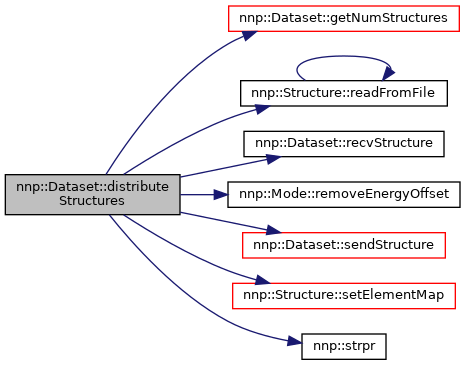

◆ prepareNumericForces()
| size_t Dataset::prepareNumericForces | ( | Structure & | original, |
| double | delta ) |
Prepare numeric force check for a single structure.
- Parameters
-
[in,out] original The structure under investigation. [in] delta Central difference delta for positions
- Returns
- Number of structures distributed (= 1 + 6 * numAtoms).
Distributes copies of original structure among all processors and modifies positions for central difference.
Definition at line 888 of file Dataset.cpp.
References nnp::Structure::atoms, nnp::Structure::comment, nnp::Mode::elementMap, nnp::Structure::isPeriodic, myRank, nnp::Structure::numAtoms, numProcs, numStructures, p, recvStructure(), nnp::Structure::remap(), sendStructure(), nnp::Structure::setElementMap(), nnp::strpr(), and structures.
Referenced by main().
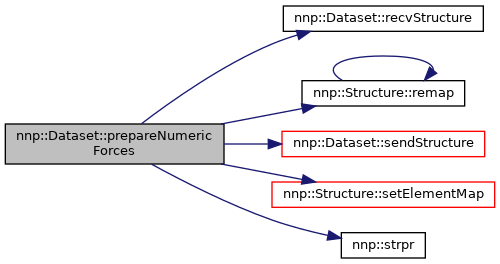

◆ toNormalizedUnits()
| void Dataset::toNormalizedUnits | ( | ) |
Switch all structures to normalized units.
Definition at line 952 of file Dataset.cpp.
References nnp::Mode::convCharge, nnp::Mode::convEnergy, nnp::Mode::convLength, nnp::Mode::meanEnergy, and structures.
Referenced by main().

◆ toPhysicalUnits()
| void Dataset::toPhysicalUnits | ( | ) |
Switch all structures to physical units.
Definition at line 963 of file Dataset.cpp.
References nnp::Mode::convCharge, nnp::Mode::convEnergy, nnp::Mode::convLength, nnp::Mode::meanEnergy, and structures.
Referenced by main().

◆ collectSymmetryFunctionStatistics()
| void Dataset::collectSymmetryFunctionStatistics | ( | ) |
Collect symmetry function statistics from all processors.
Definition at line 974 of file Dataset.cpp.
References comm, nnp::SymFncStatistics::Container::count, nnp::Mode::elements, nnp::Mode::log, nnp::SymFncStatistics::Container::max, nnp::SymFncStatistics::Container::min, MPI_SIZE_T, myRank, nnp::strpr(), nnp::SymFncStatistics::Container::sum, and nnp::SymFncStatistics::Container::sum2.
Referenced by main().


◆ writeSymmetryFunctionScaling()
| void Dataset::writeSymmetryFunctionScaling | ( | std::string const & | fileName = "scaling.data" | ) |
Write symmetry function scaling values to file.
- Parameters
-
[in] fileName Scaling data file name (e.g. "scaling.data").
Definition at line 1004 of file Dataset.cpp.
References nnp::appendLinesToFile(), nnp::SymFncStatistics::Container::count, nnp::createFileHeader(), nnp::Mode::elements, nnp::Mode::log, nnp::SymFncStatistics::Container::max, nnp::SymFncStatistics::Container::min, myRank, nnp::strpr(), nnp::SymFncStatistics::Container::sum, and nnp::SymFncStatistics::Container::sum2.
Referenced by main().


◆ writeSymmetryFunctionHistograms()
| void Dataset::writeSymmetryFunctionHistograms | ( | std::size_t | numBins, |
| std::string | fileNameFormat = "sf.%03zu.%04zu.histo" ) |
Calculate and write symmetry function histograms.
- Parameters
-
[in] numBins Number of histogram bins used. [in] fileNameFormat Format for histogram file names, must include placeholders for element and symmetry function number.
Definition at line 1103 of file Dataset.cpp.
References nnp::appendLinesToFile(), comm, nnp::SymFncStatistics::Container::count, nnp::createFileHeader(), nnp::Mode::elementMap, nnp::Mode::elements, nnp::Mode::log, nnp::SymFncStatistics::Container::max, nnp::SymFncStatistics::Container::min, myRank, nnp::safeFind(), nnp::strpr(), structures, nnp::SymFncStatistics::Container::sum, and nnp::SymFncStatistics::Container::sum2.
Referenced by main().
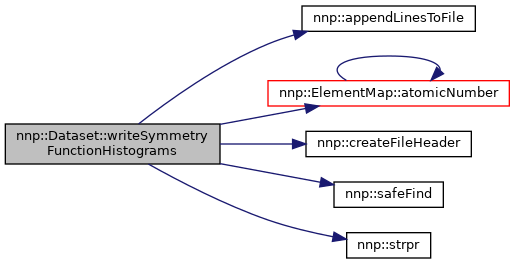

◆ writeSymmetryFunctionFile()
| void Dataset::writeSymmetryFunctionFile | ( | std::string | fileName = "function.data" | ) |
Write symmetry function legacy file ("function.data").
- Parameters
-
[in] fileName File name for symmetry function file.
Definition at line 1255 of file Dataset.cpp.
References comm, nnp::Mode::elementMap, nnp::Mode::getEnergyOffset(), nnp::Mode::log, myRank, nnp::Mode::normalize, numStructures, nnp::Mode::physicalEnergy(), nnp::strpr(), and structures.
Referenced by main().
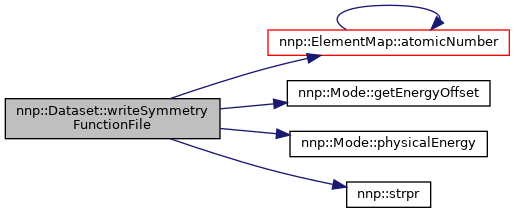

◆ writeNeighborHistogram()
| size_t Dataset::writeNeighborHistogram | ( | std::string const & | fileNameHisto = "neighbors.histo", |
| std::string const & | fileNameStructure = "neighbors.out" ) |
Calculate and write neighbor histogram and per-structure statistics.
- Parameters
-
[in] fileNameHisto Name of histogram file. [in] fileNameStructure Name of per-structure file.
- Returns
- Maximum number of neighbors.
Definition at line 1320 of file Dataset.cpp.
References nnp::appendLinesToFile(), combineFiles(), comm, nnp::createFileHeader(), nnp::Mode::log, nnp::Mode::minNeighbors, MPI_SIZE_T, myRank, nnp::strpr(), and structures.
Referenced by main().


◆ sortNeighborLists()
| void Dataset::sortNeighborLists | ( | ) |
Sort all neighbor lists according to element and distance.
Definition at line 1466 of file Dataset.cpp.
References nnp::Mode::log, and structures.
Referenced by main().

◆ writeNeighborLists()
| void Dataset::writeNeighborLists | ( | std::string const & | fileName = "neighbor-list.data" | ) |
Write neighbor list file.
- Parameters
-
[in] fileName Name for neighbor list file.
Definition at line 1490 of file Dataset.cpp.
References combineFiles(), comm, nnp::Mode::elementMap, nnp::Mode::log, myRank, nnp::Mode::numElements, nnp::strpr(), and structures.
Referenced by main().


◆ writeAtomicEnvironmentFile()
| void Dataset::writeAtomicEnvironmentFile | ( | std::vector< std::vector< std::size_t > > | neighCutoff, |
| bool | derivatives, | ||
| std::string const & | fileNamePrefix = "atomic-env" ) |
Write atomic environment file.
- Parameters
-
[in] neighCutoff Maximum number of neighbor to consider (for each element combination). [in] derivatives If true, write separate files for derivates. [in] fileNamePrefix Prefix for atomic environment files.
This file is used for symmetry function clustering analysis.
Definition at line 1536 of file Dataset.cpp.
References combineFiles(), comm, nnp::Mode::elementMap, nnp::Atom::G, nnp::Mode::log, myRank, nnp::Atom::neighbors, nnp::Mode::numElements, nnp::strpr(), and structures.
Referenced by main().


◆ collectError()
| void Dataset::collectError | ( | std::string const & | property, |
| std::map< std::string, double > & | error, | ||
| std::size_t & | count ) const |
Collect error metrics of a property over all MPI procs.
- Parameters
-
[in] property One of "energy", "force" or "charge". [in,out] error Metric sums of this proc (in), global metric (out). [in,out] count Count for this proc (in), global count (out).
Definition at line 1712 of file Dataset.cpp.
References comm, and MPI_SIZE_T.
Referenced by nnp::Training::calculateError(), and main().

◆ combineFiles()
| void Dataset::combineFiles | ( | std::string | filePrefix | ) | const |
Combine individual MPI proc files to one.
- Parameters
-
[in] filePrefix File prefix without the ".0001" suffix.
CAUTION: Make sure files are completely written and closed.
Definition at line 1744 of file Dataset.cpp.
References numProcs, and nnp::strpr().
Referenced by nnp::Training::calculateError(), nnp::Training::dataSetNormalization(), main(), writeAtomicEnvironmentFile(), writeNeighborHistogram(), writeNeighborLists(), and nnp::Training::writeSetsToFiles().

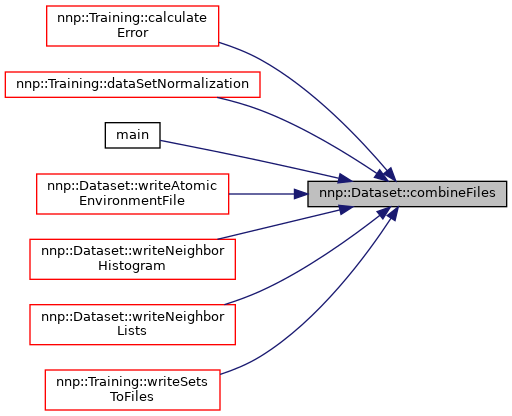
Member Data Documentation
◆ structures
| std::vector<Structure> nnp::Dataset::structures |
All structures in this dataset.
Definition at line 195 of file Dataset.h.
Referenced by nnp::Training::calculateError(), nnp::Training::calculateNeighborLists(), nnp::Training::dataSetNormalization(), distributeStructures(), main(), prepareNumericForces(), nnp::Training::selectSets(), sortNeighborLists(), nnp::Training::sortUpdateCandidates(), toNormalizedUnits(), toPhysicalUnits(), nnp::Training::update(), writeAtomicEnvironmentFile(), writeNeighborHistogram(), writeNeighborLists(), nnp::Training::writeSetsToFiles(), writeSymmetryFunctionFile(), and writeSymmetryFunctionHistograms().
◆ myRank
|
protected |
My process ID.
Definition at line 199 of file Dataset.h.
Referenced by nnp::Training::allocateArrays(), nnp::Training::calculateError(), collectSymmetryFunctionStatistics(), Dataset(), nnp::Training::dataSetNormalization(), distributeStructures(), nnp::Training::loop(), prepareNumericForces(), nnp::Training::selectSets(), setupMPI(), setupRandomNumberGenerator(), nnp::Training::setupTraining(), nnp::Training::setupUpdatePlan(), nnp::Training::update(), writeAtomicEnvironmentFile(), writeNeighborHistogram(), writeNeighborLists(), nnp::Training::writeNeuronStatistics(), nnp::Training::writeSetsToFiles(), writeSymmetryFunctionFile(), writeSymmetryFunctionHistograms(), and writeSymmetryFunctionScaling().
◆ numProcs
|
protected |
Total number of MPI processors.
Definition at line 201 of file Dataset.h.
Referenced by combineFiles(), Dataset(), distributeStructures(), prepareNumericForces(), setupMPI(), setupRandomNumberGenerator(), nnp::Training::setupUpdatePlan(), and nnp::Training::update().
◆ numStructures
|
protected |
Total number of structures in dataset.
Definition at line 203 of file Dataset.h.
Referenced by Dataset(), nnp::Training::dataSetNormalization(), distributeStructures(), prepareNumericForces(), and writeSymmetryFunctionFile().
◆ myName
|
protected |
My processor name.
Definition at line 205 of file Dataset.h.
Referenced by Dataset(), and setupMPI().
◆ comm
|
protected |
Global MPI communicator.
Definition at line 207 of file Dataset.h.
Referenced by calculateBufferSize(), nnp::Training::calculateError(), collectError(), collectSymmetryFunctionStatistics(), distributeStructures(), recvStructure(), nnp::Training::selectSets(), sendStructure(), setupMPI(), setupRandomNumberGenerator(), nnp::Training::setupUpdatePlan(), nnp::Training::update(), writeAtomicEnvironmentFile(), writeNeighborHistogram(), writeNeighborLists(), nnp::Training::writeNeuronStatistics(), nnp::Training::writeSetsToFiles(), writeSymmetryFunctionFile(), and writeSymmetryFunctionHistograms().
◆ rng
|
protected |
GSL random number generator (different seed for each MPI process).
Definition at line 209 of file Dataset.h.
Referenced by Dataset(), distributeStructures(), nnp::Training::selectSets(), setupRandomNumberGenerator(), nnp::Training::setupTraining(), and ~Dataset().
◆ rngGlobal
|
protected |
Global GSL random number generator (equal seed for each MPI process).
Definition at line 211 of file Dataset.h.
Referenced by Dataset(), nnp::Training::randomizeNeuralNetworkWeights(), setupRandomNumberGenerator(), nnp::Training::setupTraining(), and ~Dataset().
The documentation for this class was generated from the following files:
- /home/runner/work/n2p2/n2p2/src/libnnptrain/Dataset.h
- /home/runner/work/n2p2/n2p2/src/libnnptrain/Dataset.cpp